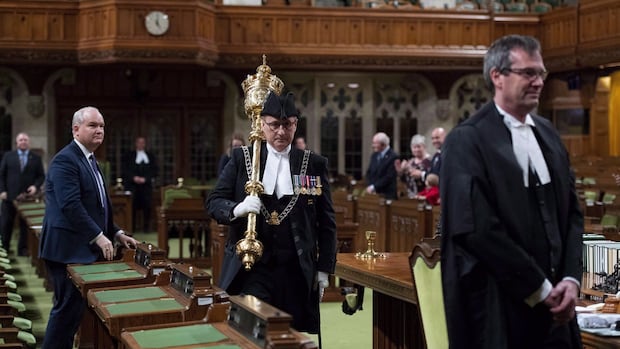The harassment members of Parliament experience from the public has jumped almost 800 per cent in the last five years, according to the person in charge of security in the House of Commons.
Patrick McDonell, sergeant-at-arms and corporate security officer, told a committee of MPs studying the House harassment policy Tuesday that the spike was driven by incidents that are “mostly online but also in person and at events.”
The number of files McDonell’s office has opened on threats to MPs has also increased significantly, he said.
“In 2019 there was approximately eight files we opened up on threat behaviours, either direct or in direct threat towards an MP, and in 2023 there was 530 files opened,” McDonnell said.
A spokesperson for the Speaker’s office told CBC News in an email that when a file is opened it means the Sergeant-at-Arms is working with “law enforcement partners to determine the credibility and veracity” of the threat. For security reasons, details about the alleged threats are not shared publicly.
McDonnell said his office has started “bulk filing” harassing complaints received by MPs because “there’s just so much of it.”
The House of Commons procedure and House affairs committee is hearing witnesses for its review of the House of Commons workplace harassment and violence prevention policy.
Tuesday’s meeting heard from House administration officials responsible for the operations of the Commons, including Clerk Eric Janse, Law Clerk and Parliamentary Counsel Michel Bédard, Chief Human Resources Officer Carolyne Evangelidis, Deputy Clerk Jeffrey LeBlanc and Speaker Greg Fergus.
McDonell said his office has been unable to get harassing social media posts removed because platforms are either not taking his calls or are not doing anything about the complaints they receive.
Sergeant-at-Arms and Corporate Security Officer for the House of Commons Patrick McDonell says there has been a significant increase in threats and threatening behaviour directed at House members, especially online.
Just a few years ago, McDonnell said, his office saw some success in getting social media platforms to remove harassing posts “that were against their own regulations,” but “in the last few years that’s fallen by the wayside.”
“Twitter used to be our best contact for bringing stuff down off social media and once the new owner took over, our contacts there were let go and now there’s nobody to contact at that particular social media platform,” McDonnell said.
Conservative MP Michelle Rempel Garner asked McDonnell what standard is used to determine a social media post needs to be taken down.
McDonnell said that posts that violate a platform’s own standards are flagged, but are only reported to the platform with the involvement of the MP being targeted.
Rempel Garner asked McDonnell if there was a lack of clarity in law that may be frustrating the process.
“I would agree,” he said.
Bloc Québécois MP Marie-Hélène Gaudreau said that House administration needs more resources because it’s not keeping pace with the threats and harassment facing MPs.
“I think the time is ripe,” she said. “We must proceed with this revision … so that beginning in September we can make proposals so that we can do this before the end of 2024.”
Evangelidis said the House administration heard her concerns and will help make that happen.
Social media harassment between MPs
Liberal MP Pam Damoff asked the House officials at committee if any action is taken when an MP posts something on social media that drives online harassment of another MP.
The clerk of the House said the Commons’ workplace harassment policy governs the relationship between MPs and their staff, but not between MPs themselves, whether inside or outside the House.
Speaker Greg Fergus, who appeared at committee after the morning break, said “it is a long-standing practice that the Speaker does not comment on statements made outside of the chamber.”
“There have been instances of members posting comments regarding fellow members on social media that some would qualify as inappropriate or even harassment. While obviously a serious matter, it is not one that the Speaker has jurisdiction over.”




